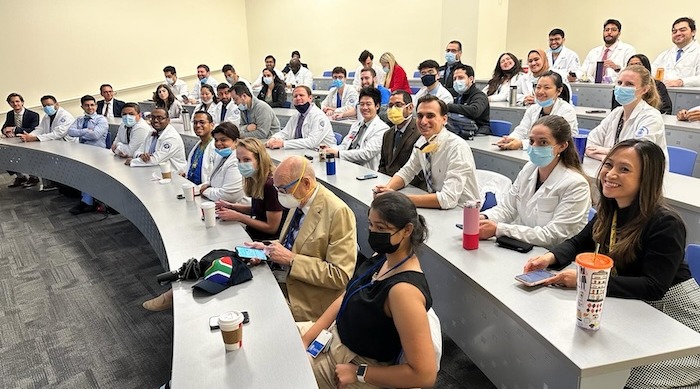Education

Didactic programs are department-wide. Campus-wide Morbidity and Mortality Conference, Grand Rounds and the Surgical Basic Science Conference, are held at Downstate on Thursday mornings. Each site has its own individual conference schedule, and resident-initiated basic science course. Residents and faculty participate in the Brooklyn & Long Island Chapter of the American College of Surgeons (BLIACS) monthly, and the annual Samuel Kountz Lecture of the Tribourough Surgical Association. Residents and faculty alike welcome these academic endeavors with great enthusiasm.
During the COVID emergency in NYC, the program worked hard to maintain the resident’s moral, physical health and provide access to mental health services. We continued our weekly conferences, covering COVID related educational topics, interesting surgical topics as they arose, and checked in with residents and faculty at each site. We held leadership meetings via zoom, at first every evening, to assure that residents had access to PPE, share ideas about how to organize services, to make plans about resident work schedules, and any need for redeployment to non-surgical services. These meetings were led by PGY5 Chief residents.
Core curriculum continued weekly with an altered schedule. Junior resident Core curriculum (This Week in SCORE) discussions were rescheduled to evenings. They were held, weekly, on two consecutive evenings so that all residents could participate. These discussions were engaging and often covered other topics and provided another arena for social interaction. PGY4’s and PGY5’s continued their oral board preparation sessions on weekend mornings and divided into two sessions. Other didactics, including a weekly journal club, were held and advertised widely.
For the 2020-2021 academic year, we recognize that some of the usual team building activities are limited. Most program-wide activities must be virtual. We have divided the residents into small houses or groups, labeling them after famous surgeons. Each house is led by a faculty member and a chief resident. This system provides a peer, social and faculty support network and provides additional opportunities for faculty mentoring. These groups offer a structure for group mentoring activities and team building. They are small enough (<10) to allow in-person social and other activities.
The program director has also met with each of the new residents’, and semi-annual meetings will start early in the academic year.
Wellness
SUNY Downstate has initiated several efforts to ensure resident, faculty, and staff wellness, including the GME Wellness Sub-Committee. This committee has developed campus-wide efforts to promote healthy clinical and educational work environments. These efforts include participation and celebration of the National Resident Appreciation Day, providing food to all overnight house staff, securing the location of a residents’ wellness lounge, and improving on streamlining emergent mental health referrals for all trainees. All residents are educated at orientation via required modules from the AMA, including Physicians Caring for Ourselves, Sleep Deprivation: Your Life and Your Work, Thriving Through Residency: The Resilient Resident, Using Tools to Form an Action Plan for Wellness.
A yoga instructor was hired to provide a team yoga class once a month. This was suspended during COVID 19 emergency and will restart as conditions allow. The institution and the program sponsored several wellness events, including virtual graduation, an Instagram dance party, catered meals, and small gifts. There was exuberant community support for residents during the COVID 19 emergency. Residents received free meals, groceries, jackets, transportation, haircuts, and special parking passes. The program is excited to be enrolled as a site in the Second Trial and was randomized to the intervention arm. We aim to improve the culture and attitudes within our surgical training program and to enhance wellness and limit burnout while building resilience. We use items in the tool kit and have participated in panel discussions contributing to the tool kit.
Furthermore, the residency-led Wellness Committee has been established to prioritize overall well-being and camaraderie by organizing various activities and events that promote a holistic, healthy lifestyle and work environment.
Rotations
First year: Five months are devoted to general surgery, one month each to vascular surgery, trauma, transplant, pediatric surgery, cardiac surgery and elective (ENT or Urology).
Second year: Residents spend half of their time on general surgery, acting as assistant residents on various services. The remaining time is spent rotating through trauma, general surgical, and cardiothoracic intensive care units, and more surgical sub-specialties such as vascular and pediatric surgery.
Third year: This year provides the bridge between junior and senior residency rotations. Usually, six months are spent as senior assistant resident on one of the larger general surgery services.
At one of our affiliate hospitals, the PGY3 serves as the senior resident, and scrubs on all the major cases. There are also two-month rotations on vascular surgery, trauma, burn and general surgery.
Fourth and fifth years: These are devoted to developing surgical decision-making capability, as well as perfecting the technical ability acquired during the first three years. During the fourth year, residents spend one month on the endoscopic/laparoscopic unit and two months supervising junior residents in the SICU. Major emphasis is placed on the teaching of surgical skills, both technical and didactic, to junior residents and students. PGY4 residents also rotate as the senior resident on the transplant and pediatric surgical services.
The fifth year is devoted to rotations through services of the core curriculum, such as general, vascular and trauma services.